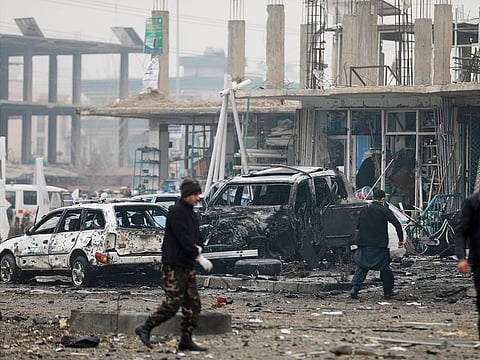Taliban faces clear and present dangers in Afghanistan
Daesh threat is existential for new rulers; economic situation could derail government

Almost three months after the Taliban’s dramatic victory over the Afghan government and the US-led Nato forces that were propping it up, the situation in Afghanistan remains tenuous at best. Government forces melted away at astonishing speed, leaving the Taliban fully in control of the entire country.
Initially, it looked like peace had suddenly been established — especially in the countryside, which bore the worst of the 20-year war between the Taliban on one side, and the Americans and their allied Afghan government on the other. There were no more drones and F-16s in the skies, and no more roadside bombs.
The Taliban suddenly found itself governing a medium sized country with 34 districts and 40 million people. To say the least, it is finding this a challenge.
The group faces two clear and present dangers. The first is the fanatical Afghan branch of Daesh that has carried out multiple, horrific bombings, and the second is the economic situation that has pushed millions onto the verge of starvation. The first danger, from the perspective of the Taliban, is almost existential.
The group has staked its claim to rule the country on the basis of providing foolproof security. That assertion is being blatantly challenged by the ultra-violent Daesh affiliate in Afghanistan, known as Deash-Khorasan. The group is so extreme that it considers the Taliban moderate. It has killed hundreds of Afghans — civilians, minorities, Taliban troops — in indiscriminate attacks at the airport, in markets and at Shiite mosques.
For its part, despite not having access to the sophisticated signals intelligence the Nato forces used against Daesh, the Taliban has launched an overt and covert war against the group, arresting hundreds and killing dozens. Taliban leaders keep assuring the world that it is only a matter of time before their destroy Daesh in Afghanistan once and for all. However, the fact that Daesh continues to mount large scale bombings makes the Taliban claims ring hollow.
On the economic front, things as just as dire. Unemployment is skyrocketing and by next month, more than half of the country’s population will face acute hunger. The IMF has suspended aid to Afghanistan, and the Taliban has been denied access to Afghanistan’s $9 billion in reserves, mostly held in the United States.
This situation is untenable and the international community cannot abandon the people of Afghanistan, no matter what its issues might be with those who are in charge of the country now.
And if the Taliban are to have any hope of ruling Afghanistan and making the country liveable for its people, they need to do all that is needed to solve these two issues.







